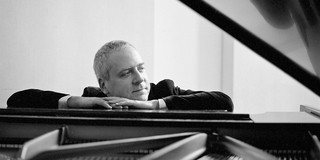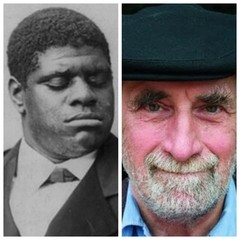|
Back
Jeremy Denk’s Gorgeous Gamut New York
Washington Irving High School Campus
02/04/2023 -
Johann Sebastian Bach: Partita No. 5 in G Major, BWV 829
Franz Schubert: Four Impromptus, Opus 142, D. 935
Samuel Coleridge-Taylor: They Will Not Lend Me a Child
Thomas “Blind Tom” Wiggins: The Battle of Manassas
Frederic Rzewski: North American Ballads: 4. “Winnsboro Cotton Mill Blues”
Scott Joplin/Louis Chauvin: Heliotrope Bouquet
Ludwig van Beethoven: Sonata No. 32 in C minor, Opus 111
Jeremy Denk (Pianist) 
J. Denk
“Perhaps the most serious complaint you could make about Bach is that he has every quality of humanity except imperfection.”
Jeremy Denk
How commonplace to say that “Schubert sings” or “Beethoven flexes his spiritual muscles.” And how rare to say “J.S. Bach grins...or even laughs.” But Jeremy Denk has such understanding of Bach–and almost everybody else from the 14th to the 21st Century–that he could opened his recital last night began with a singular Bach beguilement.
The “People’s Symphony Concerts” in Washington Irving Campus had the kind of verbal and musical mastery for which Jeremy Denk is famed. His program was both diverse and rare. His Schubert not only sang, the keyboard had a cantilena fluidity. The Beethoven Sonata was not as muscular at it was sublime. The incredibly difficult Rzewski North American Ballad was an onomatopoeia of a slave‑driven cotton mill.
And in between, Mr. Denk unearthed works which had minor import but emanated major radiation.
The Bach Fifth Partita also had radiation, and the gentleness of a composer taking a busman’s holiday from more serious chores. We have little idea of Bach’s fingering on the clavier. Mr. Denk, though, with advantage of pedals and the Steinway’s resonance, zipped through the “Preamble” and “Courante” as though he was playing Haydn. That was primary stuff. But final double‑fugued “Gigue” has tripped up other players who relished the vernal opening. Mr. Denk didn’t accent the difficulties, instead offering the cheeriness of the dance.
The word “Impromptu” by Schubert doesn’t have the same light import of a Bach Partita. It did have what happily was an excess of songs in the first two pieces. It was almost a relief to hear the single theme, with variations. The final Impromptu was a test of hand‑crossing and the most beautiful central section, executed with Mr. Denk’s signature clarity.
After four rare miniatures (see below), Mr. Denk took on the only truly heavy work, Beethoven’s final sonata, in his iconic key of C Minor. The pianist never played it heavily. He rarely lingered over the slow sections, he took that long long Adagio with a clear continuity. Rather than listening to each variation, Mr. Denk played it with unaffected continuity. After all, this wasn’t a Hammerklavier, it was a hail and farewell.

T. Wiggins/F. Rzewski
Now onto the surprises, introduced by the pianist at the microphone. First, a very rare, tender Scott Joplin work the Heliotrope Bouquet, composed with a reportedly brilliant colleague, Louis Chauvin. Then a short work by the African‑Anglo Samuel Coleridge-Taylor. They Will Not Lend Me a Child, which, unlike his other commonplace music, did have the shadow of a spiritual behind it.
Most spectacular (or at least the most memorable), The Battle of Manassas by the prodigy/prodigious/famed/blind pianist-composer Thomas Wiggins. Though the word wasn’t known during the 19th Century, he was probably autistic as well. And genius, with a knowledge of 7,000 popular and classical works.
How to describe The Battle of Manassas, based on a Civil War massacre/skirmish? Well, put together a Charles Ives pastiche, and Tchaikovsky’s 1812 Overture. Now add Dixie, Star‑Spangled Banner and Marseillaise (!), all with percussive left‑hand drumbeat. And you might have a primary idea.
To say that Jeremy Denk played it with élan would be an understatement. He offered Mr. Wiggins’ work with fireworks, panache and fierce joy.
Harry Rolnick
|